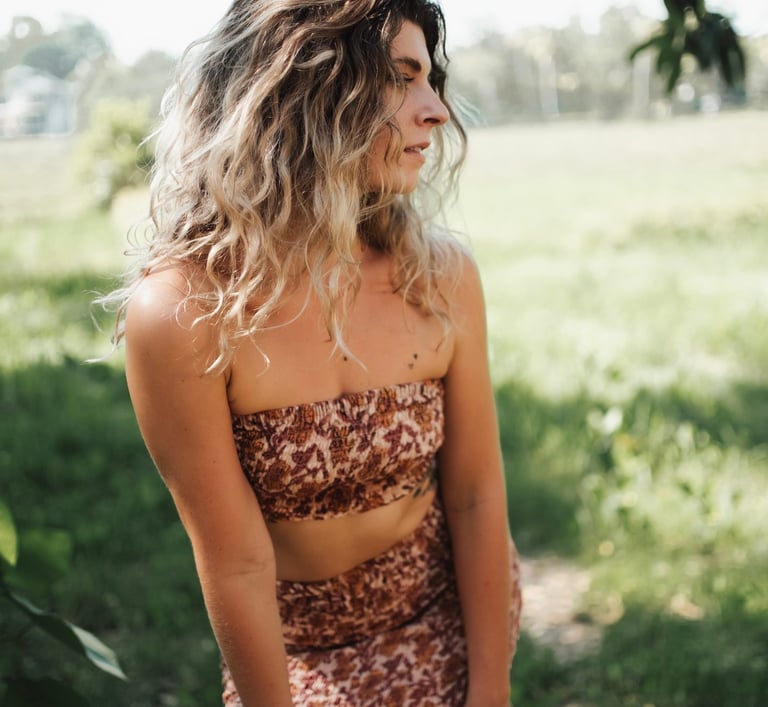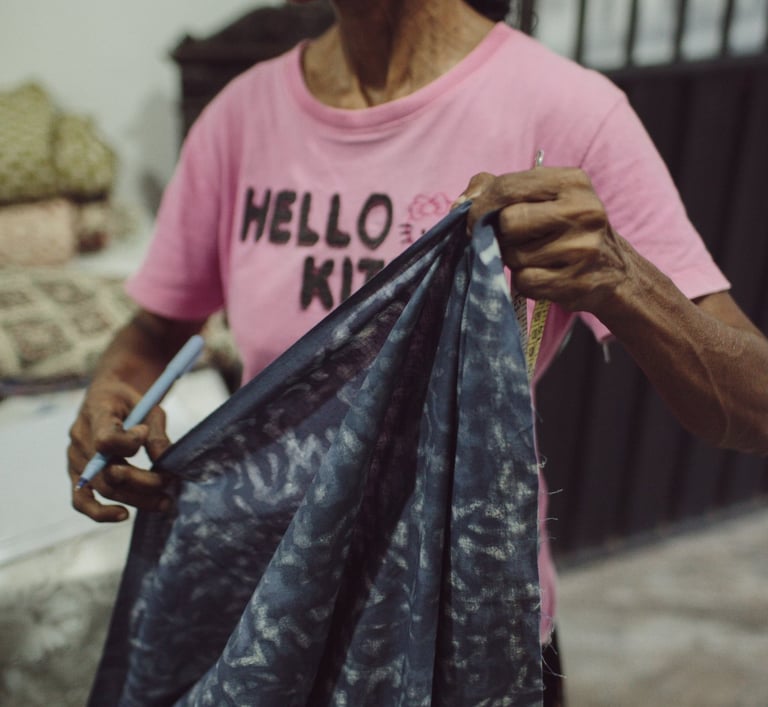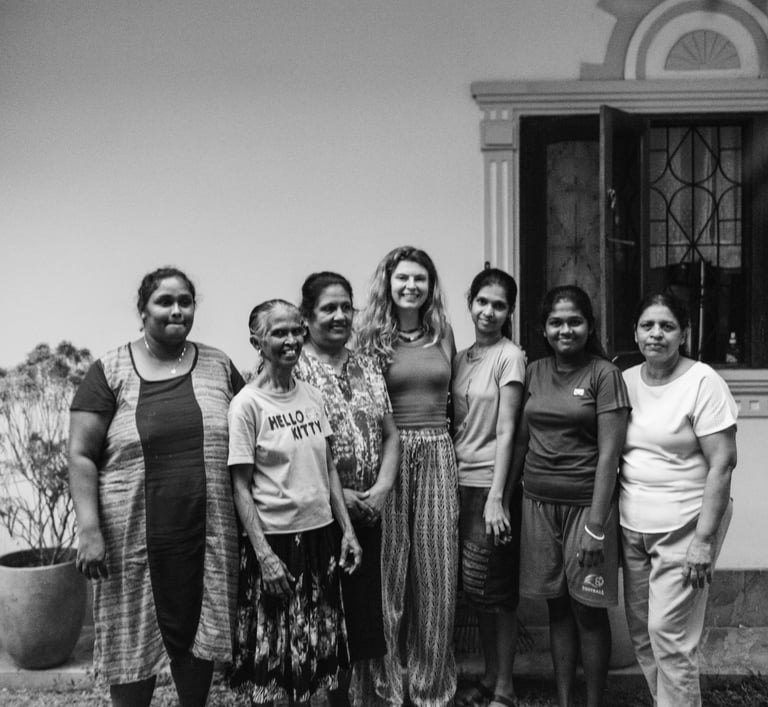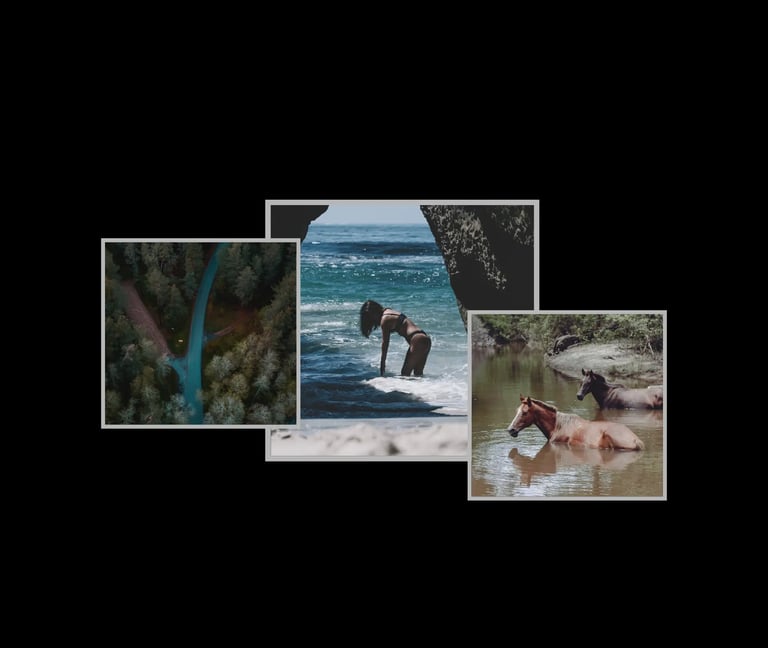Building Beauty from Imperfection: Inside the World of Buffalo the Label
PEOPLE & STORIESMEET THE FOUNDER
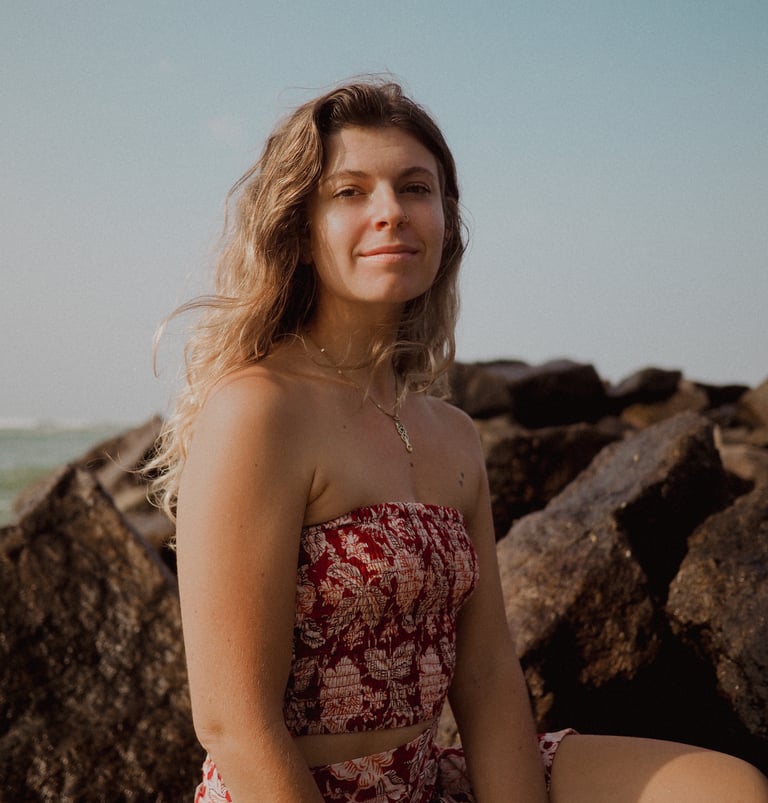

Name: Lauren Brooks
Title/Profession: Founder
Based in: United Kingdom
Business: Buffalo the Label | @buffalothelabel
For many founders, brand beginnings are born from ideas; for others, they emerge from transformation. For the designer behind Buffalo the Label, it was both. What began as a moment of stillness - a lone buffalo in a rice paddy - grew into a philosophy of slow creation, resilience, and conscious design. Rooted in Sri Lanka, Buffalo the Label champions craftsmanship, community, and imperfection as sources of beauty and strength.
In this interview, she shares the story behind the brand - from personal reinvention and creative risk to building something truly sustainable and human.
1. You’ve lived in Sri Lanka since 2019, yet you’re originally from Wales. How has that cross-cultural experience shaped who you are, both personally and as a designer?
I spent most of my upbringing living rurally on the coast of South Wales, and in many ways, there are surprising similarities between Wales and Sri Lanka - both have green landscapes, beautiful beaches, and culturally open, friendly communities. That familiar ‘village’ spirit, where life moves at a slower pace, is something I grew up with in Wales and have found again here. Aside from living in Manchester for a few years, I’m used to places where not everything is instantly available. This can sharpen your resourcefulness and your eye for gaps in the market. A bit of quiet - even ‘boredom’ - can be a great breeding ground for ideas. My time in Sri Lanka has taught me how to turn the ideas and visuals in my imagination into something tangible.
2. Buffalo the Label was born from a very human place - connection, culture, and care. Can you take us back to the moment the idea first came to you? Was there a specific experience or conversation that sparked it?
Yes, there is a fairly long-winded story attached to Buffalo the Label being born. It happened in 2022, which was one of the most challenging periods of my life. I’d just gone through a major relationship break-up, the vision I had planned for my life in Sri Lanka - or anywhere, really - had completely fallen apart. Within the same period, Sri Lanka experienced a fuel and political crisis, with up to twelve-hour power cuts most days. There was a lot of isolated, sweaty, uncomfortable time to sit with myself and try to make sense of everything. It was definitely a humbling time for me.
One late afternoon, I was sweating through another power cut, staring out at the rice paddy where there was a lone water buffalo - unusual, since they’re herd animals. It looked straight at me for a few moments. It’s hard to explain - maybe I was just tired - but it filled me with a deep sense of calm, and a reassurance everything was going to be okay. I wasn’t particularly spiritual at the time, but I guess you could argue it was a bit of a spiritual moment for me - I felt like something shifted, like a deep resilience and determination took root.
About a year later, I was still struggling to find a sense of direction or purpose. In all of this, I had been experimenting with making a few sequin skirts, and my current partner and housemate were encouraging me to make a small batch to sell. I needed to get some labels printed up, but I hadn’t come up with a brand name yet. Buffalo just felt intuitively right - that experience had stayed with me. Only later did I discover that water buffalo are often seen as symbols of strength, resilience, hard work, and patience - all of which definitely represented what I had been learning during that time.
3. You’ve worn many hats - teacher, singer, entrepreneur. How have those different chapters shaped your voice as a founder and creative?
I think the variety of experiences I’ve had over the years has really shaped my confidence to step forward creatively, without as much fear attached to it. Teaching, in particular, has had an important impact on me. You learn so much from children, especially a lot about yourself. Encouraging them to follow their passions, take risks, and believe in their ideas makes you reflect on whether you’re doing the same and are practicing what you preach.
Gigs were always a place for me to have a bit more fun with my fashion choices, experimenting with outfits for different occasions - a big motivator for the sequin skirts in Buffalo’s first iteration.
Wearing so many hats over the years has given me a surprisingly broad foundation for starting a business. A few years ago, my ‘career’ felt scattered, but now I see how each role taught me lots of skills that serve me as an entrepreneur.
4. Your work is deeply intertwined with community. What does collaboration mean to you, especially in the context of working with local women artisans and makers in Sri Lanka?
Collaboration is everything. I prioritise understanding what each person is best at. In my experience, when people are aligned with their strengths, the work can become effortless - problem-solving happens organically, and there’s a real sense of confidence and ownership over decision-making and taking initiative. Having agency is empowering and makes the work far more fulfilling.
The clothing line we’ve developed so far has grown quite naturally alongside our team of seamstresses. Each piece has been an experimentation in what works best with our fabrics, and finding that sweet spot between design and our team’s practical strengths. It’s been a really collaborative and creative process.
5. Sustainability and ethics are woven into your process - but your storytelling feels deeply emotional, not preachy. How do you approach building a brand that’s conscious yet human, not just “sustainable” by label?
Jess and I have always been environmentally conscious, but much of the mindset comes from our team here in Sri Lanka, too. There’s a deeply rooted habit of reusing and repurposing materials - something woven into village life. At its core, working in smaller batches and being low-waste is really just common sense, especially at the stage we are at with the business.
Being a small business also helps - we have the oversight to constantly review and improve our practices. I try not to be preachy about sustainability; I’m not perfect, and I miss opportunities to be more mindful at times. I simply aim to do what feels ethically right and make the best choices possible with the resources available at the time.
We feel we are working within a movement that is positively contributing to the local economy and to the fashion industry in general. But who am I to say I have all the answers or have it all perfectly figured out? Our goal is to refine, stay open to feedback, and keep both people and sustainability at the core of what we do.
I take the meaning of “sustainable” quite literally - to be maintainable. Just like overly strict diets can be difficult to stick to long-term, building a sustainable business only works if it’s realistic and is consistently refined over time.
6. Buffalo celebrates imperfection - hand-block printing, human touch, and the art of slow creation. What have these traditional techniques taught you about patience, process, and beauty?
Living and working in Sri Lanka and working with block-printed fabrics has taught me to slow down, accept that not everything is within our control, and value the process as much as the result. In a way, the story of Buffalo really comes from a place of imperfection - the first iteration was a jumble of ideas, starting with small batches of sequin skirts, satin pieces, and blockprint experiments from stray metres I found locally.
The early pieces weren’t always successful, and creatively, they didn’t fully represent what I was trying to do. It’s only when I focused on the blockprint designs that things really started to align, and the namesake and collection harmonised in a way I am really proud of.
So, I think we will always be championing the beauty of trial and error in our work, as it’s so woven into everything we do.
7. Have you ever faced a moment when sticking to your values came at a cost? What did you learn from that experience?
This is an interesting question, and I had to take some time to reflect on this. I suppose most of the hard decisions I’ve had to make in my life orbit around a core value of wanting there to be authenticity and accountability in what I do and who I surround myself with, even when that truth is messy or uncomfortable.
In the past, I’ve found it difficult to stay in jobs, friendships, or relationships where there was a disconnect between words and actions, or where I felt I was beginning to change or compromise my own values to maintain the script of others.
These days I tend to listen mostly to actions rather than words. This approach has definitely cost me at times - in both job security and relationships - but I suppose it's something I am learning to stand by.
8. What keeps you grounded and inspired when the industry moves faster than your philosophy allows?
To be honest, I try not to get too caught up in the pace of the wider industry. I am currently focusing on refining and improving what we already do, and growing the business into a stable and sustainable model. Of course, I keep an eye on trends and new ideas, but I think it’s easy to lose your sense of direction if you’re always looking sideways.
Staying connected to our process, our team, and the people who wear our clothes keeps me inspired. Collaborating with other creatives and giving them the space to bring their own vision to the brand always brings a fresh burst of energy and inspiration - especially during times when my own creativity feels a bit stagnant.
9. What has entrepreneurship taught you about yourself that you might never have discovered otherwise?
Everything! I had no idea how much personal growth and sacrifice entrepreneurship demands. I constantly find myself in situations that push me right outside of my comfort zone, or I have to learn how to do the things I’ve always found difficult. It has been a real practice in learning how to challenge self-doubt and to practice radical accountability.
The biggest thing I’ve learned about myself is how hard I can work and how long I can stay motivated. I never knew I had that level of drive in me. As a completely bootstrapped, self-funded business, Jess and I were still working full-time jobs last year while building Buffalo, so any sense of work-life balance hasn’t really been part of the equation yet. But it’s also shown me that when you genuinely love what you’re doing, it’s much easier to commit to it. It’s exciting to build something bigger than yourself.
10. For someone wanting to start a sustainable, ethical brand from scratch, what’s the single most important insight you’d share?
If you want to build something sustainable and ethical, I would suggest you make the most of the skills and resources you already have, instead of chasing things that aren’t yet within reach or don’t align with your current setup. And always listen to your team - you’re nothing without the team you’ve built around you.
